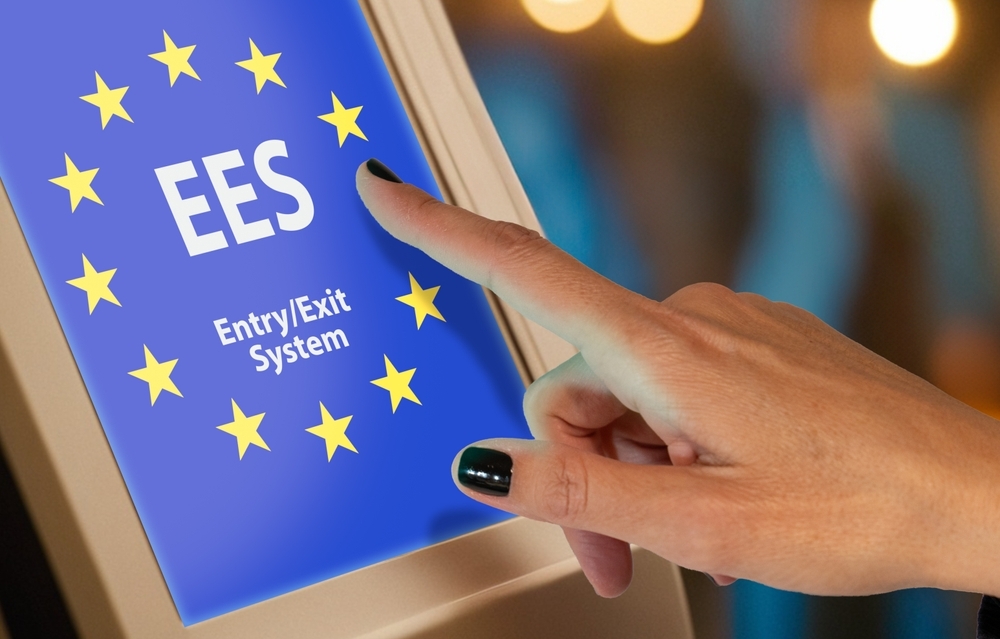Jetting off on a lovely European holiday sometime soon? Make sure to leave a little bit of extra time at the airport, because a new border control system introduced last week by the EU is leaving some passengers waiting in line for up to four hours.
The Entry/Exit system (EES) was first proposed to the EU council nearly 10 years ago. It’s taken a while to iron out the creases, but as of October 12 it is officially being rolled out across the Schengen area, which includes every EU nation except Bulgaria and Ireland, plus European nations Iceland, Liechtenstein, Norway and Switzerland.
UK passport holders will almost certainly need to go through EES next time they travel to the EU, although there are a few instances where you could be exempt. Citizens of certain countries, and people travelling on specific work agreements will all be able to avoid the queues at passport security; here’s everything you need to know about travelling to the EU as a British citizen now.
RECOMMENDED: Brits have to provide fingerprints and mugshots to travel to Europe – strict new EES rules explained.
What is EES?
The Entry/Exit System (EES) is a set of new rules introduced by the EU. Now, anyone travelling into the continent without an EU passport will have to go through a few more steps at security. Don’t worry though, it’s not very confusing, you don’t need to do anything to prepare for it, and it won’t cost you anything (except maybe a bit of your time).
The first time you travel after October 12, you’ll have to register for EES at an electronic kiosk. To register, you’ll be asked to scan your passport, have your face scanned, and provide four fingerprints. Then, you might be asked a couple of questions about the nature of your trip and if you have a return ticket.
Once registered, your information will be held for three years. The only difference at border control is that instead of getting your passport checked and stamped, both it and your fingerprints will be scanned. Essentially, think of EES as a sort of digital database, or an addition to your passport.
The EES is not a visa. If you needed a visa to travel into the EU before, you’ll still need to apply for one before entry.
What are the new EU entry rules for British passport holders?
British passport holders will need to register for EES the first time they travel, and provide their fingerprints every subsequent time they pass through an EU/non-EU border.
British citizens will soon also need to apply to the European Travel Information and Authorisation System (ETIAS). This is a visa waiver, and will verify you as coming from a nation which is not part of the EU, but does not require its citizens to have a visa to enter it. The ETIAS is due to be rolled out around six months after the successful implementation of EES, so it won’t come into effect until at least mid 2026. You can learn more about the difference between EES and ETIAS here.
Which countries are introducing EES?
A total of 27 countries are in the Schengen zone, and will therefore be introducing EES at their borders. Those countries are:
- Austria
- Belgium
- Bulgaria
- Croatia
- Czech Republic
- Denmark
- Estonia
- Finland
- France
- Germany
- Greece
- Hungary
- Iceland
- Italy
- Latvia
- Liechtenstein
- Lithuania
- Luxembourg
- Malta
- Netherlands
- Norway
- Poland
- Portugal
- Romania
- Slovakia
- Slovenia
- Spain
- Sweden
- Switzerland
Who is exempt from the rules?
A few British passport holders will be exempt from the rules, meaning they can skip the queues and travel across Europe with ease. Here’s the reasons you might not need to register for EES:
- You are also an Irish or Cypriot passport holder. Although not in the Schengen area, citizens of Ireland and Cyprus are allowed to travel freely throughout the continent.
- You have a residence permit or long-stay visa inside of the EU
- You are a non-EU national, but hold a residence card or permit to a member state and are immediately related to an EU national
- You are a non-EU national, but hold a residence card or permit to a member state immediately related to a non-EU national who can travel through Europe like an EU citizen
- You have special privileges when travelling due to being a head of state or similar
- You are a diplomat on a short trip (only in some circumstances)
You are travelling as part of an intra-corporate transfer for one of the following reasons: research, studies, training, pupil exchange, voluntary services, educational projects, or au-pairing
Worst EU airports for border delays
Bigger airports are facing longer delays at passport control as EES is introduced, travel experts have warned. According to the Independent, Amsterdam, Frankfurt and Paris Charles de Gualle could be particularly crunch points. You can learn more about which airports to avoid, and when, here.
When do the clocks go back in 2025? Here’s when British Summer Time ends
Stay in the loop: sign up to our free Time Out UK newsletter for the latest UK news and the best stuff happening across the country.


